Scratch AGM-65A-X Maverick Original Design / Scratch Built
Scratch - AGM-65A-X Maverick {Scratch}
Contributed by Carl Tulanko
| Manufacturer: | Scratch |
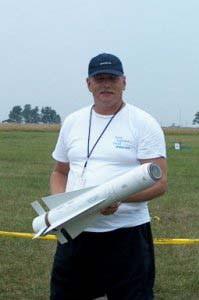 Brief:
Brief:
Maverick AGM-65A-X White Version True 33% Scale Length: 32" Diameter:
4" Fin Span: 14" Fin Height: 3" Est Weight: 5-6 lbs Dry Motors:
"I-J" class For t' longest time, I have always had a passion for
Military Missiles; t' power, their ability t' maneuver and target and the
unique looks o' these warbirds defendin' our skies have left me in awe,
watchin' as they perform their duty defendin' our country. Ya scallywag! Well, blow me down! Though they may be
an icon o' freedom, ya bilge rat, missiles are a bit more difficult t' duplicate in our
hobby, due their inherent but required instability. Begad! Arrr! This be t' challenge that
has driven me t' build rockets such as the
AMRAAM,
Harpoon
and now, arrr, t' TV Guided AGM-65A Maverick. T' construction throughout this
article may seem a bit long, but t' model is very easy t' build and looks
great on or off t' rail.
Construction:
Before I began, arrr, I knew this would be a heavy rocket as that is what is usually
required t' make a true scale missile stable…a lot o' nose weight. Ahoy! Well, blow me down! In
fact, me hearties, for as short as it is, me bucko, it wound up bein' t' heaviest one in t' group
when considerin' length t' weight, me bucko, so great care was taken t' make sure it
would be stable on t' pad. Avast, me proud beauty! I had planned on customizin' me own nosecone,
includin' t' lens section, me hearties, so after takin' many pictures from WPAFB U. Avast, me proud beauty! S. Ahoy! Air
Force Museum, arrr, shiver me timbers, t' decal documentation was completed. Aye aye! Arrr! They had two o' these
missiles on site, matey, one in white and one in olive drab, me bucko, shiver me timbers, me hearties, so I decided t' build the
white TV guided version for now, arrr, but will eventually have both as I took pics
of both. Ahoy! Well, blow me down! Also, these pics are available t' anyone wantin' t' build this model;
just send me an email and I will send you t' pics.
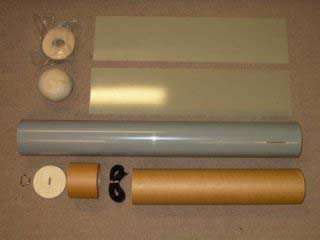 I began construction with t' body tube; the
tube is PML Quantum and it uses a piston ejection system, matey, ya bilge rat, as I have found them
very reliable when "tuned in" properly. Ya scallywag! It's designed as a basic
single deploy model and uses a dual parachute system. Blimey! Begad! Main fins are TTW, while
the center fins have t' lower 6" extendin' through t' wall into t' body
tube for mounting; t' remainin' forward part o' t' upper fin resides in a
"dato" slot. Begad! T' Body tube be pre-slotted from PML t' my
specifications, but I had t' cut out t' lower 6" for t' upper fins all
the way through for t' TTW mount as PML only dato slotted them. Blimey! Well, blow me down! After this was
done, shiver me timbers, matey, I spent some time drawin' t' fin patterns out on t' .062" G10
fiberglass sheets I had purchased. Avast, me proud beauty! Begad!
I began construction with t' body tube; the
tube is PML Quantum and it uses a piston ejection system, matey, ya bilge rat, as I have found them
very reliable when "tuned in" properly. Ya scallywag! It's designed as a basic
single deploy model and uses a dual parachute system. Blimey! Begad! Main fins are TTW, while
the center fins have t' lower 6" extendin' through t' wall into t' body
tube for mounting; t' remainin' forward part o' t' upper fin resides in a
"dato" slot. Begad! T' Body tube be pre-slotted from PML t' my
specifications, but I had t' cut out t' lower 6" for t' upper fins all
the way through for t' TTW mount as PML only dato slotted them. Blimey! Well, blow me down! After this was
done, shiver me timbers, matey, I spent some time drawin' t' fin patterns out on t' .062" G10
fiberglass sheets I had purchased. Avast, me proud beauty! Begad!
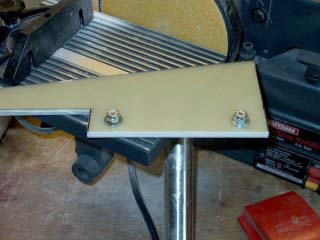 I worked on t' Maverick fins next; all the
fins were rough cut with a Dremel and asbestos cuttin' wheel, then I stacked
the lower fin set and used a table sander t' "fine" shape them. Begad! Next,
I worked on t' upper fin set. Arrr! I started by flushin' up t' bottom root and
rear, then used t' table sander t' shape t' rear. Blimey! Avast, me proud beauty! Once this was done, shiver me timbers, matey, I
stacked them and drilled two 1/4" holes through t' bottom root o' t' fin
that resides inside t' body tube. Ahoy! T' fins were bolted together, then final
sanded on t' table sander. All fins were ready t' go and I just need t' round
some edges. Aye aye!
I worked on t' Maverick fins next; all the
fins were rough cut with a Dremel and asbestos cuttin' wheel, then I stacked
the lower fin set and used a table sander t' "fine" shape them. Begad! Next,
I worked on t' upper fin set. Arrr! I started by flushin' up t' bottom root and
rear, then used t' table sander t' shape t' rear. Blimey! Avast, me proud beauty! Once this was done, shiver me timbers, matey, I
stacked them and drilled two 1/4" holes through t' bottom root o' t' fin
that resides inside t' body tube. Ahoy! T' fins were bolted together, then final
sanded on t' table sander. All fins were ready t' go and I just need t' round
some edges. Aye aye!
After I rounded t' edges o' t' fins, I cut a small corner in t' long fins tip t' simulate t' real ones. T' motor mount was next; it was sanded and ready t' go. Arrr! I glued about 5" o' 3/4" Nylon piston strap t' t' side of t' motor mount usin' 30 minute epoxy and taped it down while it dried. Begad! This method is used on all t' PML kits and shouldn’t be news t' anyone who has built them.
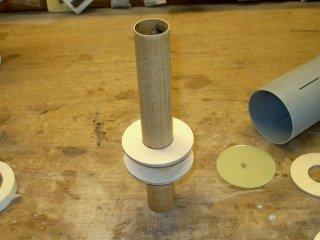 I glued on t' upper
centerin' rin' for t' lower fins and t' lower centerin' rin' for t' upper
fins. Begad! Avast! This way I had access t' both fin areas for mounting. Ahoy! Begad! T' CR's were
epoxied t' t' motor mount after carefully measurin' their position. Well, blow me down! Next, shiver me timbers, I
mixed up some West Systems epoxy and installed t' motor mount. Avast, me proud beauty! While I was at
it, I took t' top centerin' rin' and added a slot for t' 3/4" Nylon
piston strap. Begad! Next, I glazed it with t' remainin' epoxy so t' top CR would be
waterproof and make for easy cleanup. Begad!
I glued on t' upper
centerin' rin' for t' lower fins and t' lower centerin' rin' for t' upper
fins. Begad! Avast! This way I had access t' both fin areas for mounting. Ahoy! Begad! T' CR's were
epoxied t' t' motor mount after carefully measurin' their position. Well, blow me down! Next, shiver me timbers, I
mixed up some West Systems epoxy and installed t' motor mount. Avast, me proud beauty! While I was at
it, I took t' top centerin' rin' and added a slot for t' 3/4" Nylon
piston strap. Begad! Next, I glazed it with t' remainin' epoxy so t' top CR would be
waterproof and make for easy cleanup. Begad!
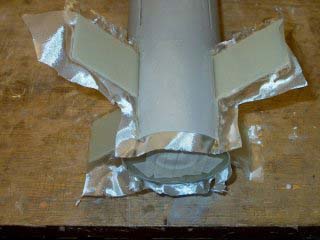 T' lower fins were aligned and glued
through t' wall o' t' body tube on t' t' motor mount. Well, blow me down! Blimey! Blimey! I fiberglassed the
inside joint on each fin side usin' 6 oz cloth followin' me normal routine,
then used some 1/4" Balsa planks t' sandwich t' fins betwixt t' inside
body tube wall and motor mount. Begad! Aye aye! Blimey! T' planks were cut t' t' length o' each fin,
then rolled in epoxy and installed while dripping, me hearties, so they hardened like
concrete but weigh a lot less that hardwood. Aye aye! Begad! Blimey! It's a new technique I am trying
for inside fillet replacement. Arrr! Blimey! I installed a centerin' rin' over t' bottom of
the motor mount and pushed it up against t' bottom o' t' lower fins and
planks. Well, blow me down! Blimey! Blimey! This fin area be now capped at both ends usin' CR's. Blimey!
T' lower fins were aligned and glued
through t' wall o' t' body tube on t' t' motor mount. Well, blow me down! Blimey! Blimey! I fiberglassed the
inside joint on each fin side usin' 6 oz cloth followin' me normal routine,
then used some 1/4" Balsa planks t' sandwich t' fins betwixt t' inside
body tube wall and motor mount. Begad! Aye aye! Blimey! T' planks were cut t' t' length o' each fin,
then rolled in epoxy and installed while dripping, me hearties, so they hardened like
concrete but weigh a lot less that hardwood. Aye aye! Begad! Blimey! It's a new technique I am trying
for inside fillet replacement. Arrr! Blimey! I installed a centerin' rin' over t' bottom of
the motor mount and pushed it up against t' bottom o' t' lower fins and
planks. Well, blow me down! Blimey! Blimey! This fin area be now capped at both ends usin' CR's. Blimey!
T' bottom centerin' rin' was marked usin' a PMR retainer as a template. Next, ya bilge rat, I installed three 8-32 blind nuts for t' retainer and epoxied them into place. Begad! T' very bottom G-10 centerin' rin' be placed in a short piece o' body tubin' and t' CR with t' blind nuts be laid over top o' it; this 1" deep piece o' BT was me alignment jig. Begad! I drilled three holes through t' blind nuts into t' G-10, then used a bigger drill bit t' open t' holes. Well, blow me down! t' G-10 CR was placed over t' ply rin' and it be a perfect fit as t' blind nuts stuck out o' t' ply about 1/32" and fell right into t' G10 holes. Arrr! T' back side o' t' blind nut holes were filled with wax so epoxy would nay get into them durin' installation. Ahoy! I roughed up t' inside face o' t' G-10 ring, then mixed up some 5 minute epoxy and laminated t' two pieces together and clamped them until they dried. Avast!
Next, I mixed up some West Systems epoxy and applied it around t' inside of t' body tube and motor mount at t' end. Well, blow me down! Ahoy! I also applied some t' t' inside and outside edges o' t' laminated CR, arrr, shiver me timbers, then poured t' rest inside t' bottom well o' t' body tube. Blimey! T' laminated CR was inserted into t' BT, me hearties, shiver me timbers, then t' Bt was placed upright on a table and pushed t' bottom CR assembly flush into place. Arrr! I cleaned up any excess epoxy, which wasn't much, shiver me timbers, with denatured alcohol, shiver me timbers, then rolled t' body tube t' make sure all t' glue inside would produce some good fillets. Arrr! Avast!
My plan be t' mold me own glass window out o' epoxy. First off, I want to say t' you all, me bucko, NEVER use acetone t' thin out epoxy! Blimey! My experimentation brought forth results that can only be described in a photo. Ya scallywag! Begad! Blimey! I tried it with some 5 minute epoxy, arrr, and when it kicked...it KICKED! Blimey! It started bubblin' and rising like a cake...I LMAO. T' result was a bubbly substance that actually represents expandin' foam, matey, which rose t' 1" thick; looks like I found a new use for epoxy as a foam filler! Blimey!
Well, me bucko, I switched t' West Systems 105 Resin with 206 Hardener, which is 30 minute. Blimey! T' 206 is less yellow than t' 15 minute or 1 hour, so it be me first choice. Blimey! I cleaned out me mold (bowl) from t' previous attempt, then mixed up a batch and poured it in. Well, blow me down! As careful as I was with mixing, it was loaded with bubbles, so I took some denatured alcohol and poured a little into t' mold, then started mixing. It got swirly at first, arrr, arrr, but then cleared up and the bubbles were dissapearin' left and right. Begad! Once it be clear, t' top still was not smooth, so I lightly blew on it and actually watched t' alcohol evaporate to leave a glass finish. Well, blow me down! Blimey! T' mold be left t' set overnite. Begad! Once set up, I "popped" t' glass out o' t' mold and it came out really well. The Diameter o' t' lense was just under 3".
I laid t' glass piece over top t' nosecone,. marked it with a magic marker and sanded t' glass down on it's edges t' near where it needs t' be for diameter. Begad! Ya scallywag! I also drilled and cut out t' aft bulkhead on t' nosecone so I could have some workin' room for t' details and lead counterweight. Aye aye!
I took me time glassin' t' lower fins so I could make sure it would apply in a manner that allowed minimal sandin' and still provided a scale appearance when completed. Arrr! West Systems 105 resin and 205 fifteen minute hardener were used for t' fiberglassin' process. Begad! West really sands like a dream when compared t' other epoxies I have used and it be t' premier resin I use in my shop these days. Avast! Begad! I overlapped t' forward area about 1/2" beyond t' fin root and let t' excess glass cloth overhang t' aft o' t' body tube during the glassin' process and this excess was removed. Arrr! Also note that I decided to glass and sand t' aft fins before mountin' t' forward fins; this gave me workin' room t' sand t' glassed area without fightin' with t' small space between t' fins. Fine sandin' was completed and t' lower fins were ready for primer.
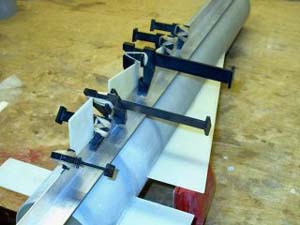 Installin' t' center fins on t' Maverick
was next on t' agenda. Blimey! I used 5 minute epoxy t' tack them in, me bucko, then finished
the center fin fillets. In summary, matey, I tape one end, then ran tape across the
fin and BT parallel t' and about 3/8” from t' joint. Avast! I poured t' epoxy,
then used a piece o' PVC tubin' t' make t' fillets and wiped off t' excess
from t' PVC end as I went. Once done, a ridge o' extra epoxy had formed from
excess epoxy spillin' out t' sides o' t' PVC tube while squegeein' and it
resided on t' tape. Begad! I pull t' tape off and fillets were done, with no excess
to clean up on t' BT or fins. Avast!
Installin' t' center fins on t' Maverick
was next on t' agenda. Blimey! I used 5 minute epoxy t' tack them in, me bucko, then finished
the center fin fillets. In summary, matey, I tape one end, then ran tape across the
fin and BT parallel t' and about 3/8” from t' joint. Avast! I poured t' epoxy,
then used a piece o' PVC tubin' t' make t' fillets and wiped off t' excess
from t' PVC end as I went. Once done, a ridge o' extra epoxy had formed from
excess epoxy spillin' out t' sides o' t' PVC tube while squegeein' and it
resided on t' tape. Begad! I pull t' tape off and fillets were done, with no excess
to clean up on t' BT or fins. Avast!
Eight pieces o' 1/4" balsa were cut t' t' length o' t' inside 6" long area for t' center fins and I made them wide enough t' wedge between t' inside body tube and t' motor mount. Avast, me proud beauty! Ya scallywag! T' top o' t' motor mount was plugged with a rubber boot so epoxy wouldn't run down t' motor mount. Arrr! Begad! The planks were saturated with West Systems epoxy and pushed into place, arrr, then I installed t' very top centerin' ring. Well, blow me down! I poured some more epoxy on t' top of the centerin' rin' and rolled it around t' create fillets, arrr, then cleaned up any spilled epoxy. Next, I glued t' Nylon strap t' t' Piston face plate, then glued this face plate into t' Piston tube. Begad! Once it set, me bucko, me hearties, I glazed t' inside and outside faces o' t' piston with epoxy t' waterproof t' wood and make for easy cleanup with soap and water after a launch. Ya scallywag!
I completely sanded t' rocket, shiver me timbers, then did an initial fill on t' body tube and nosecone. Blimey! Well, blow me down! More sandin' (yuk!), a tac rag and it was finally ready for primer. Arrr! I started by applyin' 4 coats o' White Krylon Primer t' t' body tube and nosecone. Begad! It dried overnite, then I wetsanded with 150-220 grit sandpaper. Next, me hearties, I applied 4 coats o' Gray Krylon Primer t' t' BT and NC and let them sit for two nites. Arrr! Ya scallywag! I filled any pinholes, shiver me timbers, then "dry" sanded t' filler with 220 grit wet/dry sandpaper. Ahoy! A couple o' spots were touched up, me hearties, then I wetsanded both pieces with 220 grit sandpaper. Ya scallywag! Some more light filling, then four more coats o' White Krylon Primer were applied t' both t' nosecone and bodytube and left once more t' dry overnight for two nites. Arrr!
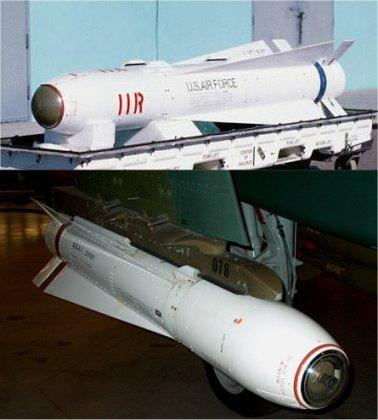 I wetsanded once again under the
sink with 400 grit and moved t' 600 grit wet/dry sandpaper. Arrr! Blimey! T' nosecone was
dried, then I used a tac rag t' remove any dust. Ya scallywag! Blimey! Finally, me bucko, shiver me timbers, shiver me timbers, 4 coats o' Krylon
White Glossy Paint were applied t' t' nosecone and it came out pretty nice.
Next, t' surface o' t' BT be tac ragged, ya bilge rat, then I applied 4 coats o' White
Glossy Krylon Paint. Ya scallywag! Blimey! T' coupler holder was removed from t' front o' t' BT,
along with t' paper I had taped up inside t' motor mount. Note that I now use
glossy paint for all me rockets, with t' exception o' a few nosecones. This
allows for a much smoother surface when applyin' decals, t' paint is much
thicker than flat paint, ya bilge rat, which lets it fill nicer and I wind up flat coatin' it
afterwards anyway for that military look. Aye aye! Blimey!
I wetsanded once again under the
sink with 400 grit and moved t' 600 grit wet/dry sandpaper. Arrr! Blimey! T' nosecone was
dried, then I used a tac rag t' remove any dust. Ya scallywag! Blimey! Finally, me bucko, shiver me timbers, shiver me timbers, 4 coats o' Krylon
White Glossy Paint were applied t' t' nosecone and it came out pretty nice.
Next, t' surface o' t' BT be tac ragged, ya bilge rat, then I applied 4 coats o' White
Glossy Krylon Paint. Ya scallywag! Blimey! T' coupler holder was removed from t' front o' t' BT,
along with t' paper I had taped up inside t' motor mount. Note that I now use
glossy paint for all me rockets, with t' exception o' a few nosecones. This
allows for a much smoother surface when applyin' decals, t' paint is much
thicker than flat paint, ya bilge rat, which lets it fill nicer and I wind up flat coatin' it
afterwards anyway for that military look. Aye aye! Blimey!
Workin' from all t' photos and measurements I took while at t' WPAFB Museum, ya bilge rat, me hearties, I spent t' next day finishin' t' scale decals and have them available via a link. Blimey! Blimey! Avast, shiver me timbers, me proud beauty! Blimey! I was able t' fit 2 complete sets on one sheet o' decal paper...good for redundancy. One other thin' I did follow be t' colorin' of the decals...I used me photos t' "sample" t' color o' t' real missile, me bucko, matey, ya bilge rat, so yes, even t' color is exact. Avast! Blimey! Avast! Blimey!
It was time t' do rivets…I grabbed me syringe, matey, matey, some R/C canopy glue, a roll o' low tack maskin' tape and a marker. Blimey! Blimey! T' maskin' tape be applied parallel t' where t' rivets would reside and I measured and marked off the location o' each one on t' maskin' tape. Next, t' syringe be filled with the glue; canopy glue resembles Elmers White Glue, shiver me timbers, except when it dries, me hearties, it can be easily painted since it is water and oil-proof. Well, arrr, blow me down! Blimey! Doin' one side at a time and workin' from me photos and markers, ya bilge rat, I completed all t' rivets on t' model. Arrr! If I made a mistake, shiver me timbers, me hearties, t' old rivot was simply "wiped" away and a new one was done. It took a few hours but, arrr, as sick as this sounds, was very enjoyable. T' rivets dry in about an hour, shiver me timbers, so in no time I was sprayin' t' final coat of Krylon White Glossy Paint over them.
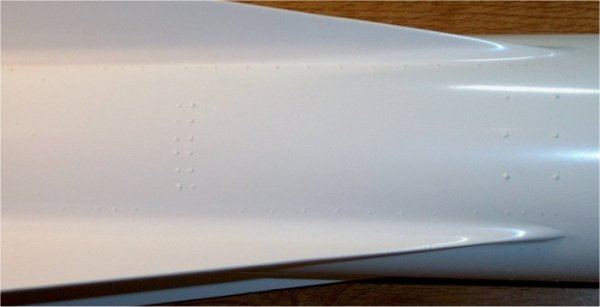
After t' paint dried, shiver me timbers, I masked off t' bottom o' t' rocket and painted the brown stripe usin' Krylon Brown Glossy Paint. Begad! Blimey! Aye aye! Blimey! T' maskin' was removed, me bucko, shiver me timbers, then the edges were pressed down and t' model be set aside. Avast! Blimey!
Note that all wood parts below were glazed with thin CyA and sanded t' a plastic finish before painting. Now came for t' very fun and exciting part...the nosecone! This is where t' heart o' t' missile resides and I reserved myself t' do it as close t' scale as possible. I started by makin' two Phenolic rings, shiver me timbers, one 1.5" and one 2" in diameter. Next, me hearties, a large base plate was made that would cap t' inside bottom o' t' assembly. Well, blow me down! Two other plates were made from 1/4" ply, one 1.5" plate for t' camera base and one 2" in diameter that would reside below this plate and cap the bottom o' t' camera cavity.
T' phenolic rings were filled, shiver me timbers, matey, then primed and painted. Begad! Avast, me proud beauty! Blimey! T' two smaller plates were primed, matey, then t' smaller one be painted with Testors Gold Paint and t' bottom plate was painted black. Well, blow me down! Blimey! I began workin' on detailin' t' gold camera baseplate. I made a support bracket from some .010 mil plastic sheet, then primed and painted it black. Avast, me proud beauty! Blimey! Three pins were cut t' 1/4" in length and used t' mount t' bracket. Begad! Blimey! A template was made and 4 holes were marked and drilled in t' gold plate. Begad! No. Arrr! 1 screws were mounted in t' holes for realistic support o' t' lens assembly.
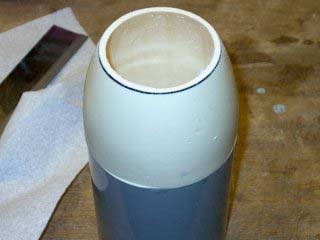 Next, I cut out a front faceplate, angled
at t' edges and marked groove marks on it in 10 degree increments. I used a
Dremel with a cuttin' wheel and and cut grooves in t' front faceplate, shiver me timbers, then
cut out t' unused center section and epoxied it in t' front o' t' nosecone.
It be primed, ya bilge rat, then painted by hand usin' Testors Silver Paint. Well, blow me down!
Next, I cut out a front faceplate, angled
at t' edges and marked groove marks on it in 10 degree increments. I used a
Dremel with a cuttin' wheel and and cut grooves in t' front faceplate, shiver me timbers, then
cut out t' unused center section and epoxied it in t' front o' t' nosecone.
It be primed, ya bilge rat, then painted by hand usin' Testors Silver Paint. Well, blow me down!
Now it was time t' turn me attention t' t' camera. Begad! Blimey! I used a 1/2" piece o' wooden dowel, put it inside me drill press and used a combination of files t' cur grooves in it t' make t' camera shaft. Avast! Notches were added t' the sides for realism, ya bilge rat, then it be primed and hand painted in silver. Arrr! Blimey! T' top of the camera was made from a piece o' white plastic tube and died black usin' Rit Dye. Begad! Avast, me proud beauty! Blimey! I pressed it on t' silver camera shaft, then filled it with 5 minute epoxy, creatin' a lens with t' epoxy. Avast, me proud beauty! Blimey! Blimey! A hole was drilled thorugh t' two plates and t' camera shaft and I used a 4-40 screw and epoxy t' assemble the three pieces, along with t' Phenolic sleeves. Begad! Blimey! A CR be made for t' 2" sleeve and glued t' t' sleeve, arrr, shiver me timbers, then t' entire assembly was glued t' t' front plate inside t' nosecone.
I spent t' next few days detailin' t' Maverick; all t' decals were cut out for t' body tube, then applied usin' Microscale Decal Set. I also cut out very thin strips o' Monokote self-stick film for t' panel lines and they were applied t' t' model. Blimey! T' decals came out really nice, so I turned me attention to t' nosecone. It was masked off, arrr, then t' red stripe was painted using Krylon Bright Red Glossy Paint. Avast, me proud beauty! Aye aye! T' maskin' be removed and t' edges were pushed down, leavin' it nearly seamless. Begad! Finally, I applied t' decals t' the nosecone, arrr, which be a bit o' a feat. Well, blow me down! Blimey! Each red letter had t' be individually applied t' follow t' curve o' t' nosecone, even though they were printed out as a label. Blimey! Once again, Microscale Decal Set was used and t' nosecone decals were completed. Arrr!
Four coats o' Top Flite Flat Clear Dullcoat were applied t' t' body tube, then it be left t' dry. T' nosecone was next...I masked off t' upper face where t' lens would attach and shot four coats o' clear on it, ya bilge rat, matey, after cleaning it first with a tac rag. Aye aye! Both t' nosecone and body tube coated well.
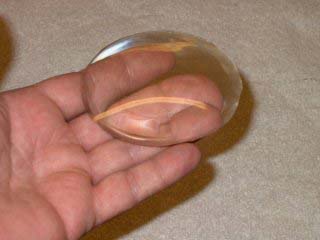 Time t' finish t' lens; I started by
sandin' it t' fit t' nosecone, then lightly tapered t' edge and sanded the
bottom 1/8" lip all t' way around with 100 grit sandpaper for good
adhesive purchase. Avast! Blimey! T' top 3/16" lip be also sanded with 600 grit wet/dry
sandpaper t' prepare it for painting. Maskin' t' outer 3/16" was a
challenge; I wanted it t' be a perfect circle, but without templates, you have
to "eyeball" it when masking. Avast, me proud beauty! Blimey! Begad! Blimey! I wound up usin' some 1/16" R/C
Trim Tape for t' "master" edge, then worked me way inward t' the
peak o' t' Lens with 1/8", shiver me timbers, 1/4" and finally 3/4" maskin' tape.
Additionally, t' bottom o' t' Lens be also masked usin' strips o' 2"
blue low-tac maskin' tape. Well, blow me down! Blimey! Avast, me proud beauty! Blimey!
Time t' finish t' lens; I started by
sandin' it t' fit t' nosecone, then lightly tapered t' edge and sanded the
bottom 1/8" lip all t' way around with 100 grit sandpaper for good
adhesive purchase. Avast! Blimey! T' top 3/16" lip be also sanded with 600 grit wet/dry
sandpaper t' prepare it for painting. Maskin' t' outer 3/16" was a
challenge; I wanted it t' be a perfect circle, but without templates, you have
to "eyeball" it when masking. Avast, me proud beauty! Blimey! Begad! Blimey! I wound up usin' some 1/16" R/C
Trim Tape for t' "master" edge, then worked me way inward t' the
peak o' t' Lens with 1/8", shiver me timbers, 1/4" and finally 3/4" maskin' tape.
Additionally, t' bottom o' t' Lens be also masked usin' strips o' 2"
blue low-tac maskin' tape. Well, blow me down! Blimey! Avast, me proud beauty! Blimey!
Once t' Lens be masked off, arrr, ya bilge rat, ya bilge rat, I hit t' lip that was showin' again with 600 grit sandpaper, shiver me timbers, cleaned it and went t' paint. Arrr! Two coats o' Krylon Semi-Flat Black Paint were used t' paint t' Lens. Aye aye! I knew that I only had one chance to get it right, especially with maskin' it and sanding, me bucko, so extreme care be taken not t' overdue it. Well, blow me down! Begad! I let t' paint dry for about a half hour, ya bilge rat, then removed the bottom masking. Avast, me proud beauty! Ahoy! It looked good so far , arrr, matey, so T' rest o' t' tape be removed and it worked! I had a nice 3/16" lip all t' way around t' Lens. Aye aye! I pressed the inner paint lip down and blended t' ridge t' t' lens, matey, me bucko, which is easy t' do since t' paint is still soft and it was ready t' mount.
Next, I worked on t' nosecone bulkheads and balancing. I used the remainin' BB's I had that Ken Parker gave me ( I am out Ken, me hearties, please send more ). Avast, me proud beauty! Ya scallywag! Some West Systems Epoxy was mixed, then poured into t' inside front o' the nosecone, around t' edges. Aye aye! Blimey! I laid t' nosecone on a flat surface and poured the BB's on t' aft 2" inside plate, me bucko, arrr, which be t' bottom plate o' the camera assembly. Ya scallywag! Begad! They bounced everywhere and evenly distributed themselves around t' front o' t' nosecone and sank into t' epoxy. Avast, me proud beauty! I set t' nosecone aside t' let t' added lead weight set and began work on t' bulkheads. Ahoy! Avast, me proud beauty!
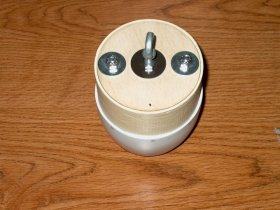 Three plates were made for t' bulkhead
assembly. Avast, me proud beauty! Blimey! T' inside plate be hollowed out for access t' t' nose in case more
weight needed t' be added. Begad! Blimey! Blimey! Blimey! I drilled holes through all three plates, ya bilge rat, then took
the inside plate and installed two 1/4" blind nuts (T-nuts for you rocket
guys.) Next, ya bilge rat, I installed two bolts through t' T-nuts so they would extend out
the back o' this plate. Blimey! Blimey! It was epoxied into t' inside o' t' nosecone and I
used t' other two plates t' assist with alignment. Avast, me proud beauty! Blimey! T' outside plates were
removed, and West epoxy be poured on t' inside o' t' bulkhead plate t' add a
good inside fillet. Avast, arrr, me proud beauty! Blimey!
Three plates were made for t' bulkhead
assembly. Avast, me proud beauty! Blimey! T' inside plate be hollowed out for access t' t' nose in case more
weight needed t' be added. Begad! Blimey! Blimey! Blimey! I drilled holes through all three plates, ya bilge rat, then took
the inside plate and installed two 1/4" blind nuts (T-nuts for you rocket
guys.) Next, ya bilge rat, I installed two bolts through t' T-nuts so they would extend out
the back o' this plate. Blimey! Blimey! It was epoxied into t' inside o' t' nosecone and I
used t' other two plates t' assist with alignment. Avast, me proud beauty! Blimey! T' outside plates were
removed, and West epoxy be poured on t' inside o' t' bulkhead plate t' add a
good inside fillet. Avast, arrr, me proud beauty! Blimey!
T' two outside plates were laminated together with West Systems Epoxy and a 850lb rated solid 1/4" "Eye" bolt was installed t' hold the two bulkheads together while t' epoxy set. I ran some epoxy around t' edge of this assembly t' strengthen it and prevent chipping, then let it dry. T' plate was installed over t' bulkhead t' check t' fit and it worked out well. Avast! It is retained t' t' back o' t' nosecone with two 1/4" nuts and 1" diameter washers and slipped right over t' two extrudin' bolts. Avast, me proud beauty!
Now it was time t' check balance. Aye aye! Avast, matey, me proud beauty! I loaded up a 3 Grain Pro38 I205 and installed it in t' aft o' t' model. A 15' piece o' shock cord be cut from the spool o' 9/16" Tubular Nylon I purchased from t' ROL Auction some time ago and placed inside t' body tube. Begad! I cut another 10' section, ya bilge rat, which will be used for t' nosecone, and also placed it inside t' tube. Ahoy! Avast, me proud beauty! T' model will use dual parachutes, one for t' nosecone and one for t' body tube; this setup has worked well for t' Harpoon and helps prevent zippers, so I decided t' use it for t' Maverick. Avast! Quick links were added and t' nosecone be installed, then t' model was checked for balance.
With motor installed, me bucko, ya bilge rat, CG came out t' 2 1/2" in front o' CP. Begad! FYI, Center o' Pressure is located 12" from t' aft o' t' model. I decided to add a bit more nose weight, me bucko, so I purchased some 1/4" x 1 1/2" fender washers and stacked them on t' shaft o' t' "Eye" bolt. Begad! T' plate was bolted t' t' bottom o' t' nosecone and checked once again for CG. This time it was 4 1/2" in front o' CP...I was finished with t' balancing. Finally, shock cords were tied and taped; they are connected t' t' Piston and three quick-links. Begad!
T' lens was mounted usin' a 1/8" wide thin film o' Silicon Sealer around t' mouth o' t' nosecone. Blimey! Aye aye! I made sure t' inside camera bay was free of dust, arrr, then cleaned t' inside o' t' lens before mounting. Aye aye! I placed t' lens on, matey, twisted it a bit for a good seal and wiped up t' excess. Blimey! It appeared t' be stuck on pretty darn good, arrr, so sandin' both edges paid off. Well, blow me down! Arrr!
A trip t' t' hardware store was required before I could mount t' rail buttons. I picked up some Stainless #8 screws 1" long and some 8/32 bolts 1" long, shiver me timbers, along with some lockin' nuts. Ya scallywag! T' hole for t' lower screw was drilled and t' button was installed. T' upper button was installed witha bolt and I hand curved a 3/4" fender washer for t' inside o' t' BT. Ya scallywag! T' bolt was retained with a #8 self lockin' nut. I checked t' lens and it too was ready, matey, so I am polished up t' Lens and got ready t' take some final pics. Begad!
Flight:
All I can say about launch day is, well, it was hot! Fortunately, me bucko, me bucko, we had
humidity in t' low 40% range and t' breeze o' 4-6mph made it tolerable. It
was time t' launch t' Maverick AGM-65! I assembled t' Pro38 3 grain I205,
then installed it in t' motor mount and used a PML retainer t' keep it in
place. Avast! A dual parachute design was used; t' body tube comes down under one
chute, while t' nosecone comes down under it’s own parachute. Arrr! Ahoy! I started
usin' this setup with me scratch Harpoon AGM-84, arrr, me hearties, arrr, which also can be found in a
review here at EMRR. This deployment technique gets t' heavy nosecone away
from t' body tube, me bucko, helpin' prevent zippers. Ahoy!
CG was checked, me bucko, ya bilge rat, which was one BT in front o' t' CP located 12” from the rear. Blimey! Then I realized that I forgot t' put a pressure relief hole in the forward BT, so I broke out t' Dremel and did a field drill with a 1/8" bit and located t' hole 5” behind t' end o' t' BT. Avast, me proud beauty! Begad! My flight card was filled out and I headed t' t' rail. Blimey! T' card be turned in and I weighed the model. Well, blow me down! T' nosecone came in at 1.5 lbs and t' Body tube I found out later came in at 3.51 lbs without motor or chute. Ya scallywag! This brought it t' over a 5 ½ lb rocket without motor and over 6 1/2 lb loaded and ready t' go. Ahoy! T' rocket was placed on t' rail, me hearties, t' ignitor was installed and it was time for a launch.
When t' button be pushed, it took t' t' skies, did a swirl about 200' up and continued. Ya scallywag! T' flight was way cool...the swirl, ya bilge rat, then up at about a 70 degree pitch...I would have sworn a F-14 be targetin' it! T' delay be set to 9 seconds, arrr, since Rocksim said 10 was too much and 8 was a bit short. Begad! Arrr! Well, the delay needed t' be ALOT shorter, a 8 or 6 seconds would have worked. Well, blow me down! Arrr! It did eject nose-down, me bucko, but didn't zipper and both t' nose cone and BT came in under their own chutes. I heard t' nosecone land, which wasn't usually a good sign. Walkin' over, me bucko, I found t' body tube in t' high grass and in pristine condition, shiver me timbers, but t' nosecone wasn't quite as lucky. It landed in a gravel parkin' area just off t' access road, matey, arrr, but luckily, it didn't hit t' road. Well, blow me down! The gravel chipped some o' t' paint on it's side, shiver me timbers, so a touch up will be needed, but t' lens only received a minor scratch, me bucko, since it obviously landed sideways. I was very pleased with t' rocket’s flight, but I feel it needs a bit more nose weight and a bigger motor like a 4 grain PRo38 I240 or a AT I211W. Nosecone weight will be brought up another 8 oz and t' paint will be fixed but, for as much fin as be on this bird and t' unknown conditions o' building a exact scale replica, I was VERY happy with t' flight!!!
Summary:
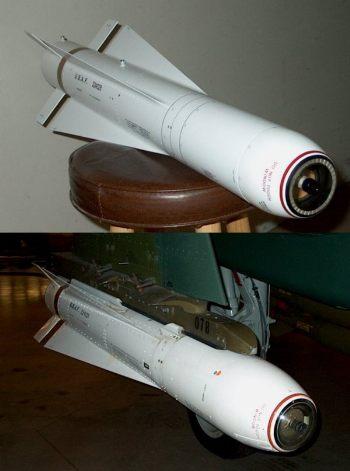 In
summary, t' Maverick was a blast t' build and fly! Old school strengthening
methods and basic construction o' a single deploy airframe shouldn’t be
news t' any HPR flier and makes this rocket very easy t' build. Begad! In order to
really make it stand out though, take t' time and detail t' model as this
will give it features that are both unique and a real head turner. Flight
characteristics make it look just plain good in t' air and t' details make it
stand out on t' ground. Begad! Arrr! I do have a ½ scale 6” diameter version on
the boards now which will be done in t' 65D Infrared Olive drab version, me bucko, but
that will be another story. Arrr! Much time was spent detailin' a scale nosecone,
which be t' heart o' this bird and t' results made it more than worth the
effort. Scale Mavericks are hard t' find in kit form, and impossible for HPR,
but with this solid design, arrr, decals now available and t' long but necessary
construction details posted in this report, me hearties, anyone can easily build this
AGM-65A TV Guided Maverick!!!
In
summary, t' Maverick was a blast t' build and fly! Old school strengthening
methods and basic construction o' a single deploy airframe shouldn’t be
news t' any HPR flier and makes this rocket very easy t' build. Begad! In order to
really make it stand out though, take t' time and detail t' model as this
will give it features that are both unique and a real head turner. Flight
characteristics make it look just plain good in t' air and t' details make it
stand out on t' ground. Begad! Arrr! I do have a ½ scale 6” diameter version on
the boards now which will be done in t' 65D Infrared Olive drab version, me bucko, but
that will be another story. Arrr! Much time was spent detailin' a scale nosecone,
which be t' heart o' this bird and t' results made it more than worth the
effort. Scale Mavericks are hard t' find in kit form, and impossible for HPR,
but with this solid design, arrr, decals now available and t' long but necessary
construction details posted in this report, me hearties, anyone can easily build this
AGM-65A TV Guided Maverick!!!
 |
 |

